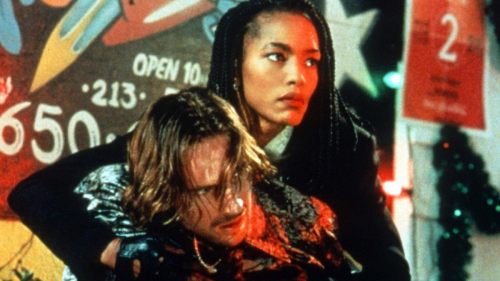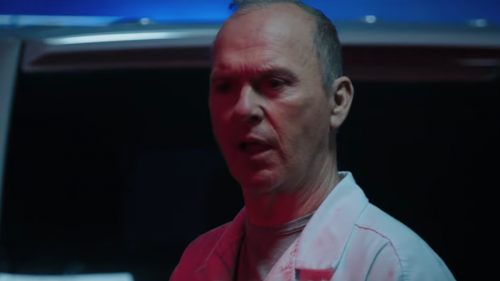ZERO DARK THIRTY Does Not Endorse Torture
Watching Zero Dark Thirty I wondered if it might not be too nuanced, too subtle for mainstream audiences. The film expects you to keep up, and it assumes you walk in the door with some basic understanding of the War on Terror as well as the US’s intelligence apparatus. Zero Dark Thirty is for the engaged viewer, not for the Act of Valor crowd.
Consider me surprised to discover that it might be too nuanced and subtle for our cultural gatekeepers as well. In the last week or so a strange controversy has erupted around the film, where some commentators - not all of whom have seen the movie - take Zero Dark Thirty to task for glorifying torture.
Glenn Kenny has written a pretty great rebuttal to the specific arguments right here - I highly recommend you read it. He takes the arguments apart methodically, so much so that it’s almost a waste of my time to write about the topic - Kenny has essentially nailed it (and I have no personal love for Glenn Kenny, a guy who has spent a lot of time trolling me, so you know I mean it when I say that).
I’m going to talk about it a bit anyway, specifically because I think that there’s more to say. It’s important to note that what follows will contain very specific spoilers for Zero Dark Thirty. If you want a more general idea of my thoughts on this, check out my review.
The film’s first images are of a protracted, brutal torture scene. Interestingly, that isn’t how the film opens - it opens on a black screen over which is played horrifying, upsetting 911 calls from the Twin Towers. These voices of panic and doom propel you right back to what it felt like in the days after 9/11, and it avoids the imagery of the day, which at this point has been so saturated in our consciousness that it’s almost meaningless. We’ve all seen that footage of a plane slamming into the tower again and again and again. It’s lost all impact, become just a shot overused in History Channel docs.
It’s a fascinating juxtaposition, because the voices of the victims remind you of the righteous anger you felt on 9/12, and maybe for a moment you’re okay with torturing the hell out of some son of a bitch who, in any small way, helped make those attacks happen. But that first torture scene goes on. And on. And on. Some have complained about the length of the sequence, but the length is where the sequence gets its power. We, like the detainee, are worn down.
The torture goes on, and as Kenny points out, there’s no doubt that cinematically we’re on the side of the detainee. The visual language of the film presents this guy as helpless, hurting, at the mercy of his captors. And when he’s about to break - as they stuff him in a tiny box - he suddenly stops himself. He’s on the verge of giving his interrogators actionable intelligence, telling them what day an attack will happen, but at the last moment he’s gripped with fortitude and he begins screaming every day of the week at them. “MONDAY! TUESDAY! THURSDAY!”
It’s kind of inspiring. It’s a moment of human courage, a moment of a guy who will not break. In a different movie this is a William Wallace moment. You have to respect that, especially after his tormentors have matter of factly informed him that everyone breaks. “It’s biology, bro,” he’s told.
But here’s the real rub: because the torturers could not break him, they do not get the intelligence they need and there is a massacre in Saudi Arabia. The film shows - starkly and without a doubt - that torture does not extract information that saves lives. Period.
And this isn’t the only attack shown in the movie. The 7/7 bombings in London and the bombing of an Islamabad Marriott both happen while the torture program is in effect, essentially showing that torture is not getting the necessary information. No one in the movie says “Torture did not get us the information we needed” simply because no one in the movie thinks that. It’s a story about CIA guys who have a complete and total belief in the efficacy of torture.
They believe in torture so much that, when Obama discontinues using it, they feel like the war is lost. Mark Strong plays a CIA muckety muck who flat out says that without torture they cannot get the necessary information to raid a compound believed to house Osama bin Laden. But get this - they still do anyway! They just use different methods. Again, the movie never has anyone say “We were able to achieve this without torture,” but it’s right there, spelled out in the chronology of the story.
Some have claimed that the film glamorizes torture. Stuart Klawans of The Nation says:
The movie juices the audience on the adrenaline generated by these physical confrontations, and offers vicariously the sense of power enjoyed by the person holding the leash.
Not only is this objectively not correct, it makes me worry about Klawans’ general wellbeing. Anyone who sits through the intense waterboarding and humiliations in Zero Dark Thirty’s torture scenes and believes they’re ENJOYABLE has something really wrong going on in their head. Truffaut famously, and correctly, said that you cannot make an anti-war film because war is always exciting and glamorous on film. Torture, however, is another matter. Even so-called torture porn films don’t glamorize torture. The whole point of showing the torture is that it’s horrible. I think we can talk about how 24 glamorized torture, in that it set it against a ticking clock scenario, but Zero Dark Thirty doesn’t do that. Not only does the film establish torture doesn’t produce actionable intelligence, it even has characters wonder what is the point of hunting down bin Laden.
Some have complained that the movie claims that torture was instrumental to finding bin Laden.
“No waterboarding, no Bin Laden: that's what 'Zero Dark Thirty' appears to suggest,”
says Frank Bruni in the New York Times. CNN’s Peter Gergen says
"'Zero Dark Thirty' is a great piece of filmmaking and does a valuable public service by raising difficult questions most Hollywood movies shy away from, but as of this writing, it seems that one of its central themes -- that torture was instrumental to tracking down bin Laden -- is not supported by the facts."
Except that Zero Dark Thirty never claims torture got us bin Laden. And it certainly doesn’t have a scene where waterboarding gets important information. What follows is very nitpicky, but I think it’s a key to understanding the movie’s stance on torture.
There is one piece of information that Jessica Chastain’s Maya, a CIA agent, obtains from the detainee torture program that leads her to bin Laden. It’s the name of bin Laden’s courier, Abu Ahmed, and over the course of almost a decade she tenaciously follows this lead until it brings her literally to bin Laden’s doorstep.
But she doesn’t get that name from torture. That guy in the opening scene, the guy who wouldn’t crack even when shoved in a tiny box, gives her the name after she tricks him. He withheld the information about the Saudi massacre, but since he’s in custody, he doesn’t know that the attack was successful. And because he’s disoriented he’s not sure whether or not he actually gave up the information. Maya tells him that he did, and that the attack was stopped, and resigned he begins giving up some information. Most of it wasn’t of interest, but that one name became the lead that changed the hunt.
We can split hairs here, saying that he only gave up the information after being waterboarded and tortured, but it was not torture that actually produced the name. It was an old fashioned verbal interrogation trick, the equivalent of a cop telling a perp that his partner in crime already confessed and laid everything at the perp’s feet. His disorientation, caused by the torture, made him more susceptible, but the fundamental nature of the trick was not torture. I also believe it would have worked without ‘enhanced interrogation.’
Following that we do see tapes of torture sessions where other detainees talk about Abu Ahmed, but no one gives Maya any information that brings her anywhere. It takes old fashioned, boots on the ground spycraft to really turn the information into anything usable, like a real location where bin Laden is hiding out. It ends up being a network of paid informants who give the location, and high tech satellite imagery that seals the deal.
A big part of the problem so many seem to have with Zero Dark Thirty is an old fashioned inability to understand the difference between showing an action and endorsing it. I’m surprised that so many smart people writing for the smartest publications out there needed to have the film step up and, holding their hand, explain that torture isn’t good. Just showing torture as horrible wasn’t enough. Just having torture be unable to stop multiple terrorist attacks didn’t do it. They needed to have a character, maybe right at the end, looking off into the sunset say “We thought we were torturing them... but maybe we were just torturing ourselves.”



